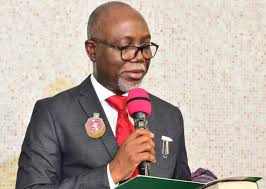
FILE PHOTO: A Microsoft logo is seen in Los Angeles, California, U.S. June 14, 2016. REUTERS/Lucy Nicholson
Microsoft said most of the challenges confronting Africa could be overcome with the deployment of technology, especially Artificial Intelligence (AI).
These challenges include security, agriculture, health and finances, among others.
Microsoft added that AI could add about $1.2 trillion to Africa’s economy by the year 2030. This amount is said to be part of the total $15.7 trillion projected as a possible contribution of the technology to the global economy by the same year.
A Commercial Lawyer with Microsoft Africa, Theo Watson, disclosed these, in his presentation, “AI Opportunity in Africa” at the virtual African AI Journalists Academy session.
Watson noted that the $1.2 trillion that could be generated in Africa would boost the continent’s GDP by 5.6 per cent by 2030.
According to him, AI needs responsible regulation for its opportunities and benefits to be fully reaped. He said as the world navigates this AI-powered future, the journey must be underpinned by responsible and sustainable innovation.
He said that this would ensure that the progress of AI in the nation remained aligned with human values and societal norms.
Watson stressed that building trust and security was key and Microsoft’s responsible AI journey started in 2016. He said that the Microsoft AI journey was accompanied by its AI principles of fairness, rehabilitation and safety, privacy and security, inclusiveness, transparency and accountability.
President for Microsoft Africa, Lillian Barnard, in a white paper, said: “The AI revolution in Africa is not just a possibility; it is already underway. With responsible regulation, partnerships, and a steadfast commitment to responsible and ethical AI, we are poised to unlock a future with unprecedented opportunities.”
Barnard said the technology could also empower a young workforce with AI-driven educational tools, enhancing their skills and future employability, adding “from agriculture to health care, AI is expected to enable faster and more profound progress in nearly every field of human endeavor and help address some of society’s most daunting challenges. “
Further, in terms of AI governance in Africa and policy frameworks for a new frontier, Microsoft noted, “As we navigate this AI-powered future, our journey must be underpinned by responsible and sustainable innovation, ensuring that our progress remains aligned with the human values, societal norms, and the needs that define Africa’s vastly diverse cultures. This involves a deep engagement with the continent’s unique challenges, recognizing their complexity and prioritizing those that AI could help solve. Collaborating with relevant stakeholders will be key to ensuring that AI solutions are not just technologically advanced, but also culturally attuned and genuinely beneficial to African societies.
Speaking also during the webinar, Government Affairs Director, Microsoft Africa, Akua Gyekye, said the world was changing and industries were transforming rapidly and drivers of economic growth were evolving.
Gyekye said that technology was addressing socioeconomic delivery issues, such as health, education, and agriculture among others, adding that the impact was real.
According to her, eThekwini Metropolitan Municipality in South Africa is leveraging AI to reduce water wastage and provide innovative water and sanitation services to its growing population.
“Farmers in Nigeria and Kenya are getting customised advice on farming based on AI, advice on soil and weather data.
“This helps them to make evidence-driven decisions and increase yields using technology to do the research and help find the right use of AI to boost the productivity of their workforce,” she said.
Gyekye however, highlighted some blueprint for governing AI that could accelerate opportunities in Africa, noting that this included promoting transparency and ensuring academic and public access to AI.








